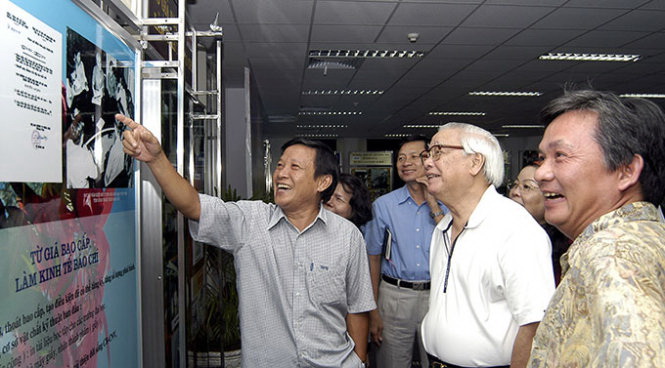Late Vietnamese President Vo Van Kiet was among the visionary leaders who were conductive to and supportive of the growth of the Internet in Vietnam.
>> The Internet turns 20 in Vietnam: P1 – Forerunners
>> The Internet turns 20 in Vietnam: P2 – Australian professor’s contribution
>> The Internet turns 20 in Vietnam – P3: The ‘semi-illegal’ era
>> The Internet turns 20 in Vietnam: P4 – National domain .vn
Prior to the official launch of the Internet in Vietnam in November 1997, then-Prime Minister Kiet was the country’s first leader to have an email address and the first-ever senior politician in a developing nation to exchange official emails with a counterpart from another country, when he wrote to Swedish Prime Minister Nils Daniel Carl Bildt to prepare for his visit to Vietnam.
The duo were also the world’s second, after former U.S. President Bill Clinton and Carl Bildt, to officially exchange correspondence via email.
During his lifetime, former PM Kiet, in office between 1991 and 1997, was one of the most prominent political leaders spearheading Vietnam’s Doi Moi, the renovation policy that urged radical solutions to fostering the country’s economic growth in the ensuing years.
Signing up for email
In April 1994, Professor Dang Huu, then-Minister of Science, Technology and Environment, tasked NetNam, originally comprised of scientists from the Institute of Information Technology under the Vietnam Institute of Science and Technology (now the Vietnam Academy of Science and Technology), and technicians from the same institute with signing him up for an email address.
Tran Ba Thai, former NetNam director, revealed his biggest asset back then was a second-hand laptop purchased from the U.S. for a few hundred dollars.
Thai and his group set up the premier’s email address on that very laptop.
“We were escorted on an elaborate ride during which we were taken to the Government Office in a Volga car,” he recalled.
 |
| Former Deputy Prime Minister Nguyen Khanh (right) is seen at a meeting chaired by Prime Minister Nguyen Xuan Phuc in March 2017. Photo: Tuoi Tre |
Minister Huu demanded non-stop power supply for the entire day to ensure the email registration went smoothly.
“Actually we only needed 15 minutes to finish the job,” Thai recalled.
Thai and his group created an email address for PM Kiet on Thai’s laptop before transferring it to the desktop computer of Dang The Truyen, PM Kiet’s secretary.
“Truyen, who had studied abroad, was quick to grasp how to use email,” Thai added.
PM Kiet’s address was vvkiet@hanoi.ac.vn, created on the Vietnam Institute of Science’s .ac domain, as official domains like .com.vn or org.vn had not been established by then, he explained.
The premier soon used this email address to write officially to his Swedish counterpart Carl Bildt.
“The prime minister’s email address was rich in symbolic significance, and relieved our anxiety and boosted our morale in keeping up our efforts to grow the Internet,” Thai shared.
“Thanks to such visionary political leaders being receptive to innovation, we managed to ‘survive’ and succeed,” the pundit concluded.
Other visionary figures
According to insiders, former Deputy Prime Minister Nguyen Khanh was also supportive of the Internet during its infancy.
He visited the Institute of Information Technology and attended NetNam technicians’ demonstrations in person.
Deputy PM Khanh spoke in favor of the Internet at important meetings, conferences and forums.
Similarly, Prof. Dang Huu, then-Minister of Science, Technology and Environment, revealed that he and his associates realized that they would encounter immense difficulty in research without the network.
“We mostly used the Internet ‘illegally’ at that time,” he admitted. “However, the more we used it, the more we realized we couldn’t do without it.”
“We put forward a so-called ‘knowledge economy’ at that time, which would be impossible without the Internet,” Prof. Huu noted.
Prof. Chu Hao, former Minister of Science and Technology, was also instrumental during the advent of the Internet in Vietnam, doing his utmost to persuade state and Party leaders to approve the launch.
The academic also expressed his support for a switch from the ‘management first, launch later’ principle to the ‘launch first, management later.’
 |
| Clients inquire about services at an outlet of FPT Telecom, one of the country’s leading Internet carriers. Photo: Tuoi Tre |
The role played by Prof. Bach Hung Khang, head of the Institute of Information Technology, was also enormous, as he successfully directed NetNam to conduct the first Internet connection experiments.
Prof. Phan Dinh Dieu was among those who tried to convince state and Party leaders to give their seal of approval to the groundbreaking technology.
Meanwhile, Vu Hoang Lien, director of Vietnam Data Communication Co. (VDC), which belongs to Vietnam Posts and Telecommunications Group, is credited with growing Internet use exponentially.
VDC is considered the most influential enterprise in the growth of the Internet in the Southeast Asian country.
Meanwhile, Dr. Mai Liem Truc, former head of the National Administration of Posts (now the Vietnam Posts and Telecommunications Group), willingly ‘mortgaged’ his own position for the tremendous benefits of the Internet during discussions with state and Party leaders.
He later launched an ‘open-door’ policy, enabling Internet service providers to compete on a fairer playground and thus benefit users greatly.
Like us on Facebook or follow us on Twitter to get the latest news about Vietnam!



















































